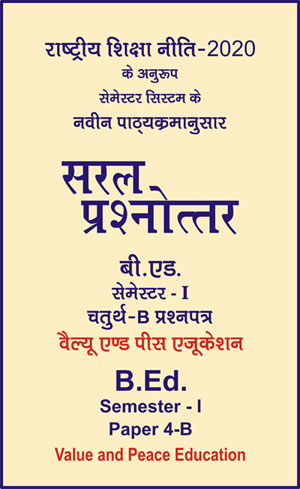|
बी एड - एम एड >> बी.एड. सेमेस्टर-1 प्रश्नपत्र-IV-B - वैल्यू एण्ड पीस एजुकेशन बी.एड. सेमेस्टर-1 प्रश्नपत्र-IV-B - वैल्यू एण्ड पीस एजुकेशनसरल प्रश्नोत्तर समूह
|
|
||||||
बी.एड. सेमेस्टर-1 प्रश्नपत्र-IV-B - वैल्यू एण्ड पीस एजुकेशन (अंग्रेजी भाषा में)
Question- What do you mean by Elderly Care? Explain in detail.
Answer -
Elderly Care
Elderly care, or simply eldercare, is the fulfilment of the special needs and requirements that are unique to senior citizens. This broad term encompasses such services as assisted living, adult day-care, long-term care, nursing homes, hospice care, and home care. Because of the wide variety of elderly care found globally, as well as differentiating cultural perspectives on elderly citizens, the subject cannot be limited to any one practice. For example, many countries in Asia use government-established elderly care quite infrequently, preferring the traditional methods of being cared for by younger generations of family members. Elderly care emphasizes the social and personal requirements of senior citizens who need some assistance with daily activities and health care, but who desire to age with dignity. It is an important distinction, in that the design of housing, services, activities, employee training and such should be truly customer-centered. It is also noteworthy that a large amount of global elderly care falls under the unpaid market sector.
When is Elder Care Necessary?
Elder care is not always an absolute; in fact, some senior citizens never require any type of care to live independently in their later years. However, elder care often becomes an issue when a loved one begins experiencing difficulty with activities of daily living (ADLs), both safely and independently. ADLs may include cooking, cleaning, shopping, dressing, bathing, driving, taking meds, etc.
A general decline in health is often the impetus for the introduction of elder care, as it may indicate a waning ability to independently handle activities of daily living. For example, senility, which usually comes on at a gradual pace, may mean that a person who once remembered to take medication on time is now having difficulty doing so. Failing eyesight may mean your loved one is gradually losing the ability to move safely about the house, or advanced arthritis may mean he or she is having difficulty getting in and out of the bathtub without assistance.
The need for elder care may also happen quickly, as is the case if your loved one is recovering from a broken hip or recently had a stroke and is still suffering the cognitive and/or physical effects.
What is constant, however, is that elder care may be needed when a health condition whether physical, cognitive, or even emotional - hinders the ability to safely complete activities of daily living.
Family members or a doctor are usually the first to recognize a need for elder care. The type of elder care that is right for your loved one, however, is largely dependent upon the type of health conditions he or she suffers from, the severity of the conditions, and the deficiencies experienced as a result.
It is up to both your loved one’s medical team and the family members closest to them to keep a close eye on any changes that may affect the ability to safely complete ADLs without assistance. There are a number of warning signs your loved one may display or exhibit that may prompt you to seek outside help.
|
|||||

 i
i 









